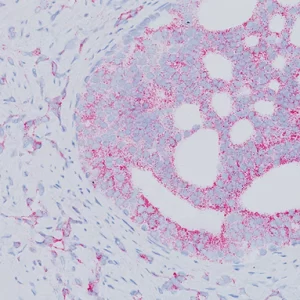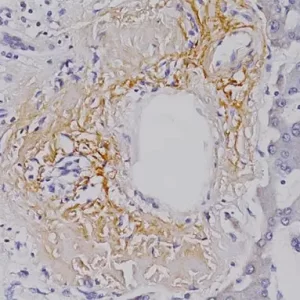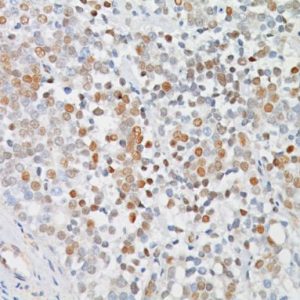Description
ALK Antibody (p80) recognizes the formalin-resistant epitope of native anaplastic lymphoma kinase (ALK) protein. ALK Antibody specifically labels t(2;5)-positive cells giving strong cytoplasmic staining that is also associated with nuclear staining. Anaplastic large cell lymphoma (ALCL) is a heterogeneous group of diseases by morphology, immunophenotyping and clinical presentation that can be difficult to diagnose because of its similarity to Hodgkin’s lymphoma. Research has shown that ALK stains the majority of CD30+ ALCL. It has been shown to not stain Hodgkin’s disease (Reed-Sternberg cells). ALK may be used in a panel with CD15, CD30, TIA-1 and EMA.
SPECIFICATIONS
Specifications
| WEIGHT | N/A |
|---|---|
| DIMENSIONS | N/A |
| INTENDED USE | IVD |
| SOURCE | Mouse Monoclonal |
| SPECIES REACTIVITY | Human |
| CLONE | 5A4 |
| ISOTYPE | IgG1 |
| ANTIGEN | AA419-520 of NPM-ALK transcript |
| LOCALIZATION | Cytoplasmic and nuclear staining (dot-like) |
| POSITIVE CONTROL | Anaplastic large cell lymphoma |
DATASHEETS & SDS
REFERENCES
1. Falini B, et al. ALK expression defines a distinct group of T/Null lymphomas (“ALK lymphomas”) with a wide morphological spectrum. Am J Pathol. 1998 Sep; 153(3):875-86.
2. Mino-Kenudson M, et al. A novel highly sensitive antibody allows for the routine detection of ALK-rearranged lung adenocarcinomas by standard immunohistochemistry. Clin Cancer Res. 2010 Mar 1; 16(5):1561-71.
3. Paik JH, et al. Screening of anaplastic lymphoma kinase rearrangement by immunohistochemistry in non-small cell lung cancer: correlation with fluorescence in situ hybridization. J Thorac Oncol. 2011 Mar; 6(3):466-72.
4. Kim H, et al. Detection of ALK gene rearrangement in non-small cell lung cancer: a comparison of fluorescence in situ hybridization and chromogenic in situ hybridization with correlation of ALK protein expression. J Thorac Oncol. 2011 Aug; 6(8):1359-66.
5. McLeer-Florin A, et al. Dual IHC and FISH testing for ALK gene rearrangement in lung adenocarcinomas in a routine practice: a French study. J Thorac Oncol. 2012 Feb; 7(2):348-54.
6. Center for Disease Control Manual. Guide: Safety Management, NO. CDC-22, Atlanta, GA. April 30, 1976 “Decontamination of Laboratory Sink Drains to Remove Azide Salts.”
7. Clinical and Laboratory Standards Institute (CLSI). Protection of Laboratory workers from occupationally Acquired Infections; Approved guideline-Third Edition CLSI document M29-A3 Wayne, PA 2005.







Reviews
There are no reviews yet.